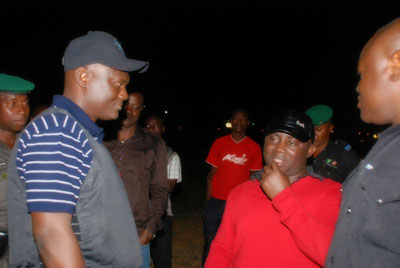Achievements
Chief Jephthah’s Resume
EDUCATION
2010: M.SC IN FINANCIAL ECONOMICS, UNIVERSITY OF ABUJA
1995: BACHELOR OF SCIENCE (B. Sc.) ECONOMICS, (UNIVERSITY OF PORT HARCOURT, PORT HARCOURT)
1981: WEST AFRICAN SCHOOL CERTIFICATE (WASC) NEMBE NATIONAL GRAMMAR SCHOOL, NEMBE
CHIEF JEPHTHAH’S PEACE EFFORTS IN THE NIGER DELTA
Chief Jephthah’s effort in conjunction with the state government to end militancy in the state was recently rewarded by a United Nations body, the United Nations-Positive Livelihood Award Centre or UN-POLAC at an elaborate ceremony to mark the World Peace Day. He was given the “Peace Ambassador” award for championing the cause of peace in the Niger Delta region.
It was not the first time Jephthah’s contribution would be noticed, nor appreciated. Many years back, similar efforts endeared him to the first governor of the state, Chief Diepreye Alamieyeseigha. Jephthah was one of those conferred with the title of Justice of the Peace.

Chief Jephthah at the disarmament of Niger Delta Militants
When the Chief Timipre Sylva-led administration came on board, amid concerns over militancy, Jephthah was, unsurprisingly, chosen to pilot the affairs of the PCRC in the state.
Since his appointment as the chairman of the committee, Jephthah had ensured that dialogue continued with the militants in the creeks. His uncompromising quest for peace and human development led to the signing of a peace undertaking between the Bayelsa State government and militants operating at the time. The successful experimentation of this peace treaty finally gave birth to the idea of amnesty.
In the heat of the amnesty programme, the man of the creeks, as Jephthah is fondly called in Bayelsa, led a group of 32 militant leaders to Aso Rock for a meeting with President Umaru Yar’Adua.
Most Rev. Ugochukwu Ezuoke, the Archbishop of the New Aba Province of the Anglican Communion, in his speech at the investiture event, praised Yar’Adua for the amnesty programme.
Ezuoke who is also the Chancellor, Royal Peace College Nigeria, noted that without the amnesty programme, no amount of force would have contained the crisis in the Niger Delta region, even as he commended those God used as instruments of peace in the oil-rich region.
“If not for the amnesty, children of the region who would have survived the conflagration would have grown up to seek vengeance,” said Ezuoke who also justified the agitation, saying “despite the exploration of oil in the region, it remains the poorest and most under-developed in the country.”
He also commended Jephthah for championing the cause of peace in the Niger Delta despite the challenges.
The Regional Director for UN-POLAC for Africa, Obong Etong, who spoke in the same vein, commended the recipient of the award, Jephthah, for his role in bringing peace back to the region.
“It’s the delight of UN-POLAC to note that rather than carrying the gun, Jephthah opted to promote peace and contributed to the restoration of peace in the Niger Delta,” he said.
In his acceptance speech, Jephthah said he was overwhelmed by the award, adding that that it was the best he had received in life.
He also relived the risky moments he had in the creeks but expressed gratitude to God that his efforts were not in vain.
“I am highly humbled with the award,” he said. “This is the biggest recognition from an international organisation like the United Nations, in my life. While I am not solely responsible for the prevailing peace in the Niger Delta, I am happy that the little role I played was recognised.”
I have absolute belief in President Umaru Yar’Adua to change the course of the Niger Delta history because he personally gave me his word when I led 32 militants including Boyloaf to him.